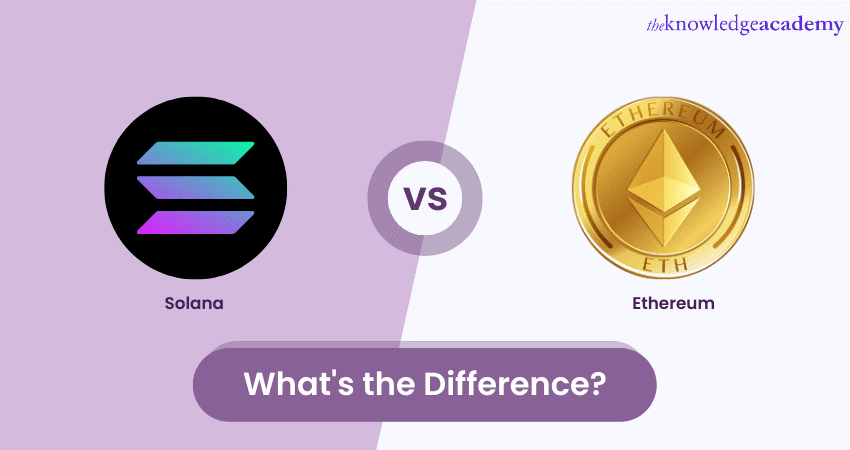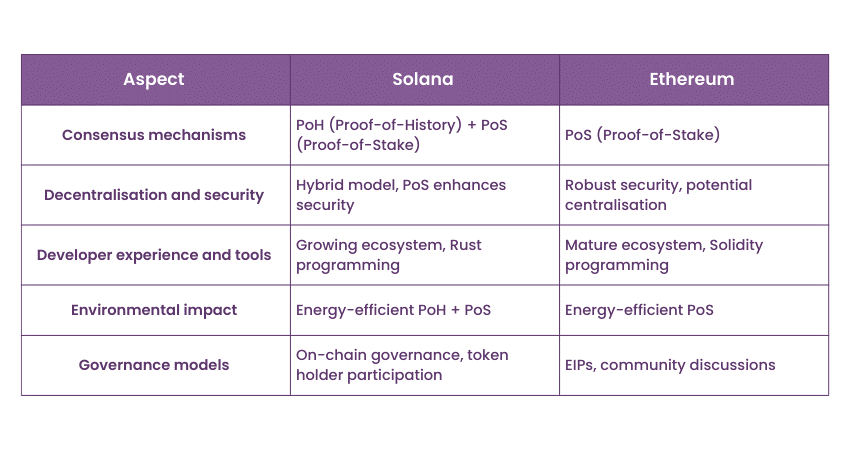We may not have the course you’re looking for. If you enquire or give us a call on +44 1344 203 999 and speak to our training experts, we may still be able to help with your training requirements.
Training Outcomes Within Your Budget!
We ensure quality, budget-alignment, and timely delivery by our expert instructors.

In the evolving Blockchain Technology world, two names often stand out: Solana and Ethereum. But what sets them apart? Why should you consider one over the other? In this blog, we delve into the key differences between Solana vs Ethereum, exploring their unique strengths and use cases.
Solana vs Ethereum is a hot topic among developers and investors alike, as both platforms offer compelling features for decentralised applications (DApps), DeFi, and NFTs. Comprehending their distinctions can help you make informed decisions about which Blockchain best suits your needs. Dive in as we compare and contrast these two Blockchain giants, shedding light on their capabilities and potential impact on the digital finance future and beyond.
Table of Contents
1) What is Solana?
2) What is Ethereum?
3) Solana vs Ethereum: Key Differences
4) Popular Use Cases of Ethereum and Solana
5) Conclusion
What is Solana?
Solana is a high-performance Blockchain platform tailored for developing decentralised applications (dApps). It employs a combination of proof-of-stake (PoS) and an innovative mechanism known as proof-of-history (PoH) to deliver rapid transaction speeds and minimal fees. Solana has emerged as a significant contender, captivating the attention of developers, investors, and enthusiasts alike. Renowned for its exceptional throughput, innovative consensus mechanism, and unique approach to scalability, Solana presents a fresh perspective on how Blockchain networks can achieve unprecedented levels of efficiency and speed.
In addition to its technical prowess, Solana’s growing ecosystem of Decentralised Applications (DApps) and projects further solidifies its position in the Blockchain space. From DeFi platforms to NFT marketplaces, Solana’s low transaction fees and high-speed capabilities attract a diverse range of developers and users. As Solana Blockchain continues to expand and mature, it holds the capacity to redefine the standards of Blockchain performance and usability.
What is Ethereum?
Ethereum is a decentralised, open-source Blockchain platform that facilitates the deployment of smart contracts and decentralised applications (dApps). Created by Vitalik Buterin in 2013, it was launched in 2015.
Ethereum Blockchain introduced the revolutionary concept of smart contracts, which automate the execution of predefined actions without intermediaries. This innovation has reduced fraud and inefficiencies, transforming traditional agreements and interactions.
Ethereum’s smart contracts have given rise to numerous Decentralised Applications (DApps) across various sectors, including finance, supply chain management, and gaming. The network’s programmability allows developers to create transparent solutions. To address scalability issues, Ethereum 2.0 was introduced, transitioning from Proof-of-Work (PoW) to Proof-of-Stake (PoS), enhancing scalability and reducing energy consumption.
Unlock the potential of Blockchain development with our comprehensive Ethereum Developer Training - sign up now!
Solana vs Ethereum: Key Differences
In our exploration of the contrasts between Solana and Ethereum, it becomes apparent that each platform possesses distinct strengths and weaknesses. Let's delve deeper into the difference between Solana and Ethereum:

1) Consensus Mechanisms
Ethereum and Solana employ divergent consensus mechanisms to authenticate transactions and uphold their respective Blockchains. Ethereum's network relies upon the energy-efficient PoS mechanism. Conversely, Solana takes a unique approach with its consensus mechanisms – combining PoH and PoS to attain elevated throughput and scalability. PoH forges a historical record of events, enabling validators to efficiently arrive at a consensus regarding the order of transactions. PoS adds an additional layer of security, as validators are selected depending on the number of tokens they have, and are willing to "stake" as collateral.
2) Developer Experience and Tools
While Ethereum 2.0’s new PoS model provides strong security, Solana takes a fresh approach with its PoH and PoS hybrid model. By incorporating PoS, Solana ensures that validators have a tangible stake in the network's security, making malicious attacks less likely. Additionally, PoH bolsters security by establishing an immutable chronological order of events, further fortifying the platform against tampering.
3) Developer Experience and Tools
Ethereum boasts a mature and well-established ecosystem, complete with a wide array of development tools, frameworks, and languages. Developers predominantly use the Solidity programming language to create smart contracts.
The Solana ecosystem is rapidly gaining traction, driven by a concerted effort to provide developers with efficient tools and a friendly environment. Developers often turn to the Rust programming language for writing smart contracts on Solana. The platform's exceptional speed and cost-effectiveness make it an attractive option for developers seeking to swiftly build, test, and deploy their applications.
Gain the skills to navigate the digital currency revolution with our Bitcoin and Cryptocurrency Course– sign up now!
4) Environmental Impact
Ethereum 2.0’s new PoS mechanism helps it reduce energy consumption by a margin as compared to its predecessor. However, Solana's blend of PoH and PoS mechanisms affords it an advantage in terms of energy efficiency. The significantly reduced energy consumption aligns with the demand for Blockchain platforms to adopt more environmentally conscious practices.
5) Governance Models
Ethereum's governance model has evolved over time, primarily through Ethereum Improvement Proposals (EIPs) and community discussions. Conversely, Solana is charting its own course in terms of governance. The platform utilises an on-chain governance model, allowing token holders to actively participate in decision-making. This approach enables a more streamlined decision-making process and potentially accelerates the implementation of protocol upgrades. However, like any governance model, it requires careful consideration to maintain fairness and inclusivity.
6) Speed
Both Solana and Ethereum are highly respected Blockchains in the market. Solana’s development team has successfully created a fast and reliable Blockchain capable of handling significantly more transactions than Ethereum. On the other hand, Ethereum remains the leading network in the market, showing no signs of slowing down. Therefore, after conducting your own research, it might be wise to consider holding both tokens in your portfolio.
Gain hands-on experience and practical insights with our Blockchain Courses – start your journey now!
Popular Use Cases of Ethereum and Solana
Ethereum and Solana offer compelling use cases, particularly within the realms of Decentralised Finance (DeFi), Non-Fungible Tokens (NFTs), and Web3 gaming. Let’s take a closer look at how each Blockchain is shaping these rapidly evolving spaces.
Decentralised Finance (DeFi)
a) Ethereum: Protocols like Aave (lending/borrowing), Uniswap (decentralised exchange), and Compound (money markets) boast billions in Total Value Locked (TVL). These platforms allow users to borrow, lend, swap, and earn yield on crypto assets without traditional intermediaries.
b) Solana: DeFi on Solana is rapidly expanding. Projects like Raydium (automated market maker), Mango Markets (margin trading), and Serum (order book-based DEX) offer alternatives to Ethereum. While TVL is smaller, Solana’s speed and low cost attract users looking to actively trade or participate in complex DeFi strategies.
Non-fungible Tokens (NFTs)
a) Ethereum: NFT marketplaces like OpenSea and Rarible, built on Ethereum, dominate digital art and collectable sales. Projects like Bored Ape Yacht Club and CryptoPunks have seen massive trading volumes. However, gas fees can make minting and smaller transactions expensive.
b) Solana: Solana marketplaces like Magic Eden are gaining popularity, offering lower fees for creators and buyers. NFT projects like DeGods and Okay Bears demonstrate Solana’s growing foothold in the NFT space. Recently, Solana’s daily trading volume for NFTs has overtaken Ethereum.
Web3 Gaming
a) Ethereum: Games like Axie Infinity popularised the play-to-learn model and used Ethereum for their in-game assets and NFT marketplaces. However, scalability issues and fees often impact the gameplay experience, and Ethereum games have declined.
b) Solana: Upcoming games like Star Atlas and Aurory showcase Solana’s greater potential for immersive, graphically intensive Blockchain gaming environments. It's speed, and low fees are key for smooth and accessible play-to-learn experiences.
Conclusion
To sum it up, the debate between Solana vs Ethereum highlights the dynamic nature of Blockchain Technology. Whether you prioritise Solana’s transaction speeds or Ethereum’s robust ecosystem, both offer unique advantages. Moreover, staying informed about these differences will empower you to make strategic decisions in the world of decentralised finance.
Sign up for our Blockchain Training and be part of the future of technology - secure your spot today!
Frequently Asked Questions

Solana struggles with network instability and centralisation concerns, while Ethereum faces high transaction fees and scalability issues. Both networks need to improve infrastructure to support growing demand and maintain decentralisation, ensuring robust security and efficiency.

Ethereum leads in market adoption with extensive Decentralised finance (DeFi) and Non- fungible Tokens (NFT) ecosystems, while Solana is gaining traction due to its high-speed transactions and low fees. Ethereum's established reputation contrasts with Solana's rapid rise as a competitive alternative.

The Knowledge Academy takes global learning to new heights, offering over 30,000 online courses across 490+ locations in 220 countries. This expansive reach ensures accessibility and convenience for learners worldwide.
Alongside our diverse Online Course Catalogue, encompassing 17 major categories, we go the extra mile by providing a plethora of free educational Online Resources like News updates, Blogs, videos, webinars, and interview questions. Tailoring learning experiences further, professionals can maximise value with customisable Course Bundles of TKA.

The Knowledge Academy’s Knowledge Pass, a prepaid voucher, adds another layer of flexibility, allowing course bookings over a 12-month period. Join us on a journey where education knows no bounds.

The Knowledge Academy offers various Blockchain Trainings, including the Ethereum Developer Training, Blockchain Training, and Bitcoin and Cryptocurrency Course. These courses cater to different skill levels, providing comprehensive insights into Types of Blockchain.
Our Advanced Technology Blogs cover a range of topics related to Blockchain Technology, offering valuable resources, best practices, and industry insights. Whether you are a beginner or looking to advance your Technical skills, The Knowledge Academy's diverse courses and informative blogs have got you covered.
Upcoming Advanced Technology Resources Batches & Dates
Date
 Blockchain Training Course
Blockchain Training Course
Thu 16th Jan 2025
Thu 6th Mar 2025
Thu 22nd May 2025
Thu 24th Jul 2025
Thu 4th Sep 2025
Thu 11th Dec 2025







 Top Rated Course
Top Rated Course



 If you wish to make any changes to your course, please
If you wish to make any changes to your course, please


